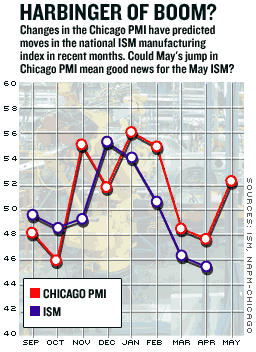NEW YORK (CNN/Money) - The way Wall Street reacted to Friday's report on Chicago-area manufacturing activity, you'd think it was a sign the rest of the nation's factory sector was about to rebound, along with the broader economy.
Could Wall Street be right?
The National Association of Purchasing Management-Chicago said Friday its index of regional factory activity jumped to 52.2 in May from 47.6. The news almost immediately doubled the morning's gains in U.S. stock prices, as traders hoped it meant a key national manufacturing index, due Monday from the Institute for Supply Management (ISM), would also post a surprising jump.
Economists, on average, expect the ISM number to rise to 47.6 from 45.4, according to a Reuters poll. But those same economists also failed to predict the dramatic jump in the Chicago number, and recently the ISM has followed moves in the Chicago index pretty closely.
On the other hand, one only has to look as far back as November 2002 to find a time when the Chicago index exploded above 50, the benchmark level showing growth in the sector, but the ISM number stayed rooted in contraction mode.

"In terms of being a predictor for the national index, the Chicago number has a spotty record," said Lehman Brothers chief economist Ethan Harris.
But Harris also said the Chicago number was at least a decent indicator of the direction the national number would take; he raised his forecast for the national ISM to 48 from 47, on the basis of the Chicago reading.
And even though the national ISM number didn't follow the Chicago number higher in November 2002, it eventually caught up, posting a significant gain in December.
"If the ISM index does not rise as much as the Chicago PMI did in May, it will likely catch up in June," said Mark Vitner, senior economist at Wachovia Securities. "[This] suggests the wartime related slowdown is over."
Blaming the war
Federal Reserve policy makers have long maintained that weakness in manufacturing, consumer spending and other economic indicators in the early months of the year was related mainly to uncertainty surrounding the build-up to the U.S.-led war with Iraq.
Once the war was over, the thinking went, consumer confidence would improve, and businesses would increase their spending and hiring. In the several weeks since the war's end, consumer confidence has indeed improved, but businesses have shown no sign of adding new workers, threatening the ability of consumers, whose spending fuels more than two-thirds of the economy, to stay cheerful.
Though some economists have predicted the Fed will cut rates at their next policy meeting, scheduled for June 24 and 25, recent gains in manufacturing could be enough to convince them that their view of a post-war bounce was correct and that hiring will eventually catch up to the other data.
"Remember, it was surprising weakness in the purchasing managers' survey which triggered the Fed's first surprise easing move back in early 2001," Vitner said.
| Related stories
|

|
|
|
|
On Jan. 3, 2001, the Fed began a long, aggressive campaign of rate-cutting in response to initial signs -- including those from the manufacturing sector -- of the recession that began in March 2001 and likely ended some time later that year.
Eventually, central bank policy makers would take rates down to 41-year lows, supporting the consumer spending that has carried the economy through a prolonged slump in manufacturing and business spending.
Though rates are likely to stay low for a long time, many economists say companies need to start expanding their businesses, building new production capacity and hiring new workers, if consumer spending is to stay strong and the economy is to return to its full potential.
And one month's decent manufacturing data doesn't necessarily mean that process has begun, some economists said.
"The Chicago PMI, along with other mixed data we've been getting, points, in my mind, to a turning point," said Merrill Lynch senior economist Gerald Cohen. "But you have to be careful reading too much into this -- it's a survey of 200 firms in the Chicago area with a 50 percent response rate. I think we're at a turning point and will get a rebound, but the strength of that rebound is still in question."

|

